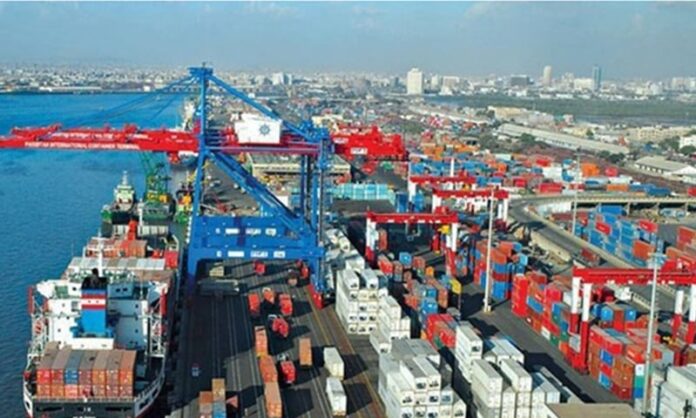ISLAMABAD: Although the country’s exports are expected to face the impact of Covid-19 in the current fiscal year, the International Trade Centre’s latest export potential assessment for Pakistan sees the country’s exports rising by up to $12 billion by 2024.
“More than half of Pakistani exporters struggle with domestic and foreign regulatory barriers,” said Invisible Barriers to Trade – Pakistan 2020: Business Perspectives. The report was prepared in collaboration with the World Bank Group’s country office in Pakistan.
The report, which is based on a survey of 1,152 importers and exporters, identifies the toughest trade hurdles facing Pakistani businesses. It gives policymakers insight into which policies, procedures and facilities must be strengthened to reduce trade costs and boost competitiveness.
“Almost half of these hurdles are homegrown, which means the government has the ability to fix many of the problems holding back its exporters, the report stated, suggesting ways for the government and the private sector to crank up competitiveness by addressing issues such as export inspections, tax refunds, and export certification.
The ITC report identifies the most challenging non-tariff measures that Pakistani businesses face. Among these are difficulties complying with technical requirements, lack of trade-related information and inadequate domestic infrastructure.
Women entrepreneurs also face social constraints and a general lack of sufficient support in government agencies and business support institutions.
The NTM Business Survey in Pakistan finds that 49pc of small enterprises and 57pc of medium-sized firms have trouble with non-tariff measures, while 54pc of large companies consider them to be burdensome.
Almost half of the challenges these firms reported stem from Pakistani rules on matters such as export inspections, tax refunds, and export certification. These invisible barriers to trade affect exporters and importers differently, and their impact varies across sectors.
The key findings of the report show regulations and the procedures to comply with them are difficult for 51pc of Pakistani exporters and 46pc of importers. Most agricultural exporters (60pc) – especially those dealing with fresh and processed foods – experience difficulties with these measures, as most countries have stringent regulations in place to protect human health and the environment.
In comparison, 47pc of the Pakistani companies that export manufactured goods face problems. Conformity assessment is the top challenge technical measures are the main obstacle for exporters. Conformity assessment requirements such as testing and product certification are a bigger concern (41pc) than rules related to quality standards, safety, and production processes (4pc).
Pakistani exporters say complying with European rules is difficult and the accompanying conformity assessment procedures are too strict. The neighbouring SAARC countries account for only 5pc of the problems that Pakistani exporters experience with foreign regulations.
At the individual partner country level, the United Arab Emirates and the United Kingdom are responsible for the most reported regulations, each accounting for 8pc. German measures account for 6pc, while Oman and the United States account for 5pc each.
Domestic regulations create obstacles Pakistani regulations account for about 45pc of the troublesome measures that exporters face. Most of these involve export inspections (31pc), tax refunds (27pc), and export certification (10pc).
Pakistani policies cause 55pc of the problems reported by exporters of manufactured goods and one-third of the difficulties that agriculture exporters experience. Large firms (52pc) face more problems with domestic export regulations than small and medium-sized businesses (45pc).
Pakistani exporters say the regulations are overly strict or compliance is difficult in just 12pc of the cases. In contrast, the procedures are the problem in 70pc of the cases – and most of these occur in Pakistan itself. The remaining 18pc is difficult due to both the regulation itself and related procedures. More than two-thirds of these obstacles occur in Pakistan.
The most important ones are slow processes on the necessary paperwork and high fees and charges to obtain required certification or testing. Informal payments and inadequate facilities for testing and certification in Pakistan were also frequently reported.
As a way forward the survey identifies numerous challenges, especially regarding export-quality management and infrastructure in the country. Improving quality infrastructure and enforcing quality compliance are key to export development. For instance, Pakistan should increase the capacity of local laboratories to carry out required testing and certification.

























Good
The issue is : anyone can buy quality certificate by paying money. Army wants portion of profit.
Generals wants to be partners. Export cannot be competition of Army industrial complex. In addition friends of Imran khan are knocking the doors and misusing his name to get what they want , even with or without Imran knowledge. Madrassas funding must be stopped .Madrassas – they are taught – world is flat. What do you expect?? Pakistan existance is the issue of pakistan . If Sindh , a 10000 years old culture , independent nation ; Baluchistan an independent nation also KP is given back to Afghanistan -Pakistan could have been very rich country because of farming. Pakistan would be doing a lot of export to Sindh , Afghanistan/KP and Baluchistan .
You have to be kidding me. You really think, KP, Balochistan, Sindh should just be given to other countries, and left on their own, even against their own will? So, for you Pakistan is solely Punjab, which couldn’t be farther from the truth. Sure, Pakistan has had it’s fair share of problems and hiccups in the past. But the fact that the populace now has that clearly, even if the government fails, many new and competent people will arise. Pakistan has potential and will rise, and Pakistan isn’t only Punjab…